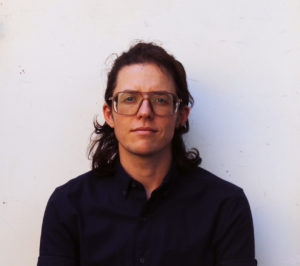 This post was written by Marlo Longley, who received the AMIA+DLF Cross-Pollinator Travel Award to attend the 2019 AMIA Conference and AMIA+DLF Hack Day in Baltimore, Maryland.
This post was written by Marlo Longley, who received the AMIA+DLF Cross-Pollinator Travel Award to attend the 2019 AMIA Conference and AMIA+DLF Hack Day in Baltimore, Maryland.
Marlo is a Digital Repository Developer for the Metropolitan New York Library Council (METRO). At METRO he is working on the 2020 release of Archipelago, an open source repository system committed to flexible metadata. Last year he helped build Canyon Cinema’s new catalog search and website, and got interested in technical issues facing moving image archives from there. Marlo is based in Oakland, CA.
AMIA archivists are already hackers. This is something I learned right away at my first ever Hack Day.
At its core hacking is solving problems with the tools available. Knowing this, the many uses of the word “hack” start to fall into place, like hacking a log with a dull blade or hacking into a database without the password.
At Hack Day, the problems to be solved come from the frustrations and wish lists of working archivists. The tools at hand are excellent – expertise in the field, enthusiasm, and open-source software. The only limitation is time! But the short time frame leads to a spirit of why-not-give-it-a-shot, and experimentation that can’t always happen on the job.
Everyone at Hack Day works with technology daily, whether it’s vintage hardware at a digitization station, ffmpeg in the command line for file conversion, or complex Excel sheets for project management.
People arrived at Hack Day wanting to improve their day to day workflows, most of which don’t involve heavy coding. I’ve worked in software development longer than A/V archiving, so I learned a lot from the range of proposals. The group split up into 5 teams tackling different problems.
One participant managed large film digitization projects, often dealing with multiple vendors. Her job would be easier if the metadata returned from vendors was more uniform.
A lot of Hack Day participants work in digital preservation and commonly use the tool BagIt. Another participant wished there was a bulk method for validating lots of Bags at once.
I joined a group researching automated audio transcription tools. My teammate ran an audio archive. He wanted to make his content more searchable and accessible by adding transcripts, but transcribing hundreds of hours of audio was beyond the powers of his small company. We talked about data privacy and the pros and cons of running archival content through open-source vs commercial AI services.
My team ended up reviving and documenting an abandoned transcription codebase on GitHub, hoping that others can now play around and evaluate its usefulness for archivists.
The audio my teammate provided for testing was an on-the-ground recording from the G8/G20 summit protests in 2010 in Toronto. This small bit of archival content helped keep things in perspective while I was in the weeds debugging bash commands.
Hacks of all kinds exist in the film archiving world, with the underlying goal to preserve and share history and culture. AMIA Open Source contributors want to maintain the usability of older tech that might play a crucial role in an institution’s workflow, build their own tools from scratch that respond to community needs and won’t suddenly end up behind a paywall, or share how-to guides to save new archivists hours of headache.
What’s so valuable about Hack Day is the mix of knowledge in the room. I left feeling happy that a community of technologists is collaborating and sharing, rather than competing, to bring the field forward.
I want to shout out the team that took on a very meta project: organizing information on Hack Day and projects from past years into a wiki. Check that out here. Thanks to my teammates, Hack Day organizers, and AMIA Open Source for welcoming me and teaching me a lot!
